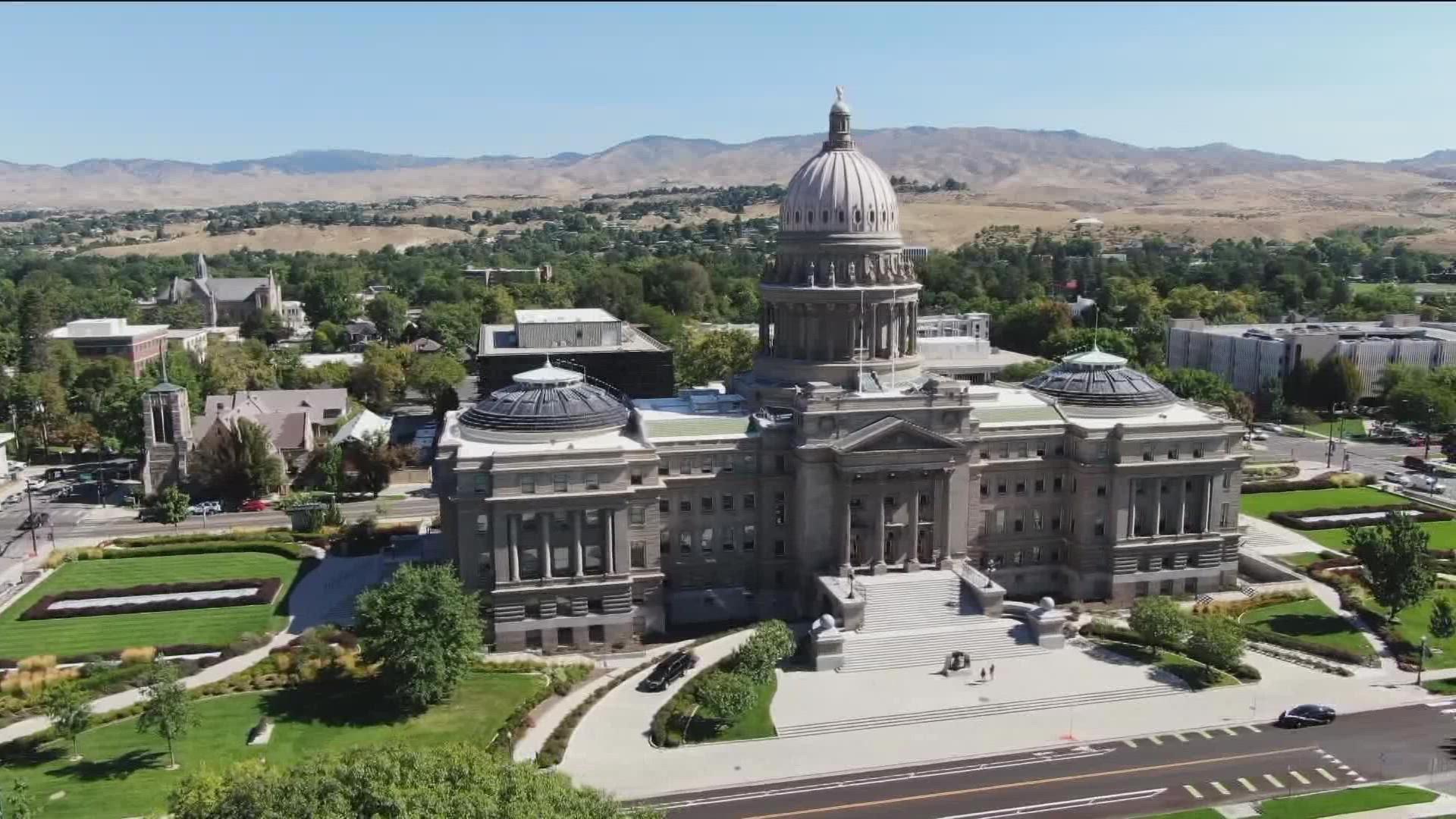BOISE, Idaho — This article originally appeared in the Idaho Press.
Amid pleas for help to counter the effects of inflation and rising costs of living, Idaho lawmakers are faced with determining how much to raise state employee compensation.
Joint Change in Employee Compensation Committee members heard testimony on Jan. 18 from agency directors and received hundreds of written comments from employees as they gear up to decide what to recommend to the state’s budget writers. The CEC committee is scheduled to meet again 3 p.m. Wednesday.
State government is Idaho’s largest employer, with around 16,500 employees, according to a presentation from Lori Wolff, Idaho Division of Human Resources administrator.
The state’s HR department and the governor’s budget recommend a 4% merit increase for most of the state’s employees and a 10% raise for law enforcement. This recommendation considers lower revenues due to tax cuts, fund diversions from the September 2022 special session, and a predicted mild recession, according to Alex Adams, Division of Financial Management administrator.
“We have built the budget around conservative assumptions,” Adams told committee members.
The state had a nearly 22% turnover rate in 2022, Wolff said, and a 12% vacancy rate, which accounts for around 2,500 unfilled positions.
Last session, lawmakers approved funds for 3% across-the-board raises, with an average of $1.25 per hour for merit-based increases. This was the equivalent of 7% for raises, but the merit portion varied by employee, the Idaho Press previously reported.
“I think maybe we need to give ourselves a little more credit sometimes, that we are reacting to these things as we try to address these challenges that we’re all facing,” Sen. Jim Guthrie, R-McCammon, said at the meeting, noting some decrease in open positions and increases in applicants.
‘Grateful, but …’
A call for comment from employees returned 221 responses, said Christine Otto, Legislative Services Office budget analyst.
Of those, 39% fell into a category called “grateful, but,” Otto told committee members. These comments reflected gratitude for last year’s investments as well as the opportunity to work for the state and a strong desire to continue to do so. However, they followed this grateful sentiment by naming continuing or worsening problems they’ve experienced.
“I first want to say that the state wages are great for the most part, and I do not want to seem ungrateful and I know that in time as I get older money will come,” a Department of Health and Welfare employee wrote. “But since the economy is the way it is right now I feel like the compensation is not adequate for what the economy is doing.”
A Department of Environmental Quality employee wrote that he and many of his co-workers have technical degrees in sciences and engineering, and know they could make higher wages in the private sector.
“... we stay because we strongly believe in the work we do,” the employee wrote. “Unfortunately, everyone has a breaking point though, and there comes a time in which frustration builds to the point in which government employees feel there are no alternatives but to seek higher-paying positions.”
Many commenters noted the benefits package state employees get, including the retirement program called Public Employee Retirement System of Idaho, or PERSI, and said it’s not enough of a reason for employees stay or candidates to accept jobs.
One Division of Public Works manager wrote that his department could not fill positions.
“We are consistently offering a pay rate that is too low for our job candidates, and we hear many times over that they can’t come to work for us for that low amount of pay, and even when we discuss the amazing benefits of PERSI, health insurance, paid time off, we often hear the response, ‘I can’t feed my kids with PERSI,’ or ‘I can’t make my mortgage with health insurance,’ the manager wrote.
Testimony from agency directors mirrored the sentiments of many of the comments. Most focused on the fact that turnover is too high, and the increased workload on remaining employees is affecting morale.
The highest turnover rate is among registered nurses. Department of Health and Welfare Director Dave Jeppesen said that at State Hospital West, in Nampa, turnover jumped to 37%. He said the department is also not receiving applicants to fill those vacant positions and is having to turn to traveling nurses to keep proper levels of staffing and care.
“It’s frustrating, because you have co-workers leave, what happens is that the shift charge nurse is now on the phone calling to see who can come in on their day off or just pull a double shift to cover what needs to be covered,” Jeppesen told the committee. “You have a traveling nurse who walks in that’s making twice what you’re making. You have to train them for a week to figure out how to do their job, and it definitely is discouraging and disgruntling for the employees.”
One health and welfare department employee wrote that she’s worried there “will be a mass exit for those who are not feeling valued.”
All seven agency directors who testified said their turnover rates are too high.
Rex Force, vice president for health sciences at Idaho State University, said the university’s turnover rate increased by 30% from the previous year.
“This is an unprecedented one-year jump,” Force said.
‘I am working just to survive’
The comments show rising inflation and housing costs are a major factor for employees seeking higher pay; around 68% of comments received were about inflation or living costs, Otto said.
Wolff told the committee that the inflation rate in the region is trending at around 8%.
Rep. John Gannon, D-Boise, doesn’t see the governor’s 4% pay increase as even coming close to accounting for inflation.
“Inflation is just huge in our state, and in our area in particular,” Gannon said in an interview, “and any kind of pay raise has got to reflect that, otherwise it’s totally inadequate.”
One Department of Agriculture chemist wrote, “I am no longer working to live life, I am working just to survive and afford the basic human necessities (I don’t even have a car payment), and that just seems a little unfair to me.”
An Idaho State University network administrator said that despite having a degree and industry certifications, he struggled to provide for his family.
“As a single father, I have additional responsibilities and expenses that make it difficult for me to live on my current salary,” he wrote. “In addition to my full-time job as a network administrator, I also work two part-time jobs just to pay my bills.”
A health and welfare department program specialist said she’s been paying $25 for five dozen eggs, meaning she needs to work one hour to buy eggs to feed her family of five.
An ISU professor said his family now considers “milk and eggs as splurges.”
Guthrie, in the meeting, said inflation isn’t unique to state employees.
“It’s all over the state, everybody is fighting this battle,” he said. “... I just hope we can kind of keep the big picture in mind.”
Asked by Sen. Janie Ward-Engelking, D-Boise, if there’s more that could be done for employees than the 4% increase, Adams told the committee that the governor’s budget was made to be sustainable. It’s up to the Legislature to decide how to spend the money, he said, but there are important considerations lawmakers need to make.
“Think of it as like a tower of Jenga blocks, as you start pushing out some of those blocks or increasing expenditures more than we recommended, if you start reducing revenue more than the $120 million in tax relief we recommended,” Adams said, “when does the whole tower start to fall down?”
Gannon told the Idaho Press, an example of the state dealing with inflation, “and how it’s affecting everybody,” is the per diem rate for lawmakers whose primary residence is more than 50 miles away from the Capitol is now $221 per day of the session. Last year, this allowance was $139 per day. This change, set by the Citizens’ Committee on Legislative Compensation, represents a 59% increase.
Gannon said he’s going to recommend an 8% increase in employee compensation to account for inflation.
“We need to make state employment attractive to Idahoans,” he said, “and right now, the turnover, the vacancy rate, the proposed low pay increase, and the fact that retirees only got 1% PERSI increase, it’s just simply not doing the job.”
This article originally appeared in the Idaho Press, read more on IdahoPress.com.
Watch more Idaho politics:
See all of our latest political coverage in our YouTube playlist:



